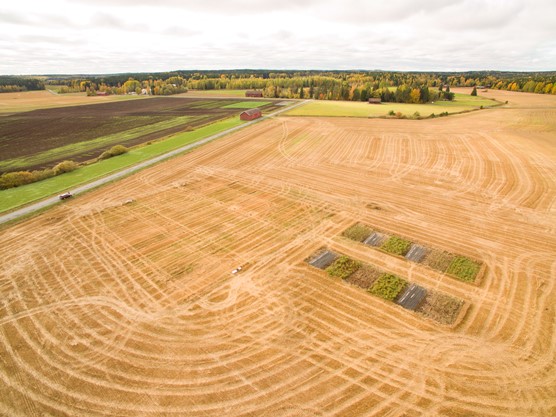Finland is the country with the highest areal proportion of peatlands globally. Forests on peat soils represent about ¼ of the total forest area, and GHG emissions from their soils (8.5 million tonnes CO2eq) reduce the CO2 sink of the LULUCF sector by 25%. GHG emissions from cultivated peat soils (7.8 million tonnes CO2eq) contribute over 10% of the total GHG emissions (55.6 million tonnes CO2eq) in Finland.
Overall goal is to reduce greenhouse gas (GHG) emissions from organic peat soils under agriculture and forestry. The project will verify the means to reduce greenhouse gas (GHG) emissions in agriculture and forestry with paludiculture and forest management methods. The project will disseminate research findings and promote the implementation of the climate-smart management practices.
The continuous cover forestry (CCF) is practiced without clear cuttings and ditch network maintenance (DNM) as the tree stand itself can maintain a favorable WT level with aerobic surface layer for roots. Paludiculture (PC) is biomass production on peat soils with a raised water table (WT) level. As peat has originally accumulated due to high WT, the best way to slow down its decomposition and the related emissions is to raise the WT in sites that have been drained for agriculture or forestry.
We provide demonstration sites that have essential role in the dissemination of the results to the land owners and extension services. The demonstration site will be maintained with GHG monitoring for 5 years to allow numerous site visits of the stakeholders and their associates. In addition, 5-year period allows us to show annual variation of the GHG fluxes in practice and to demonstrate that decrease of GHG fluxes is obtained with designed control of water table.
The project will be conducted in close cooperation with landowners and thus will yield useful information on the constraints and potential of the methods. It will also provide new data for the development of the emission factors used in the national GHG inventory for rewetted agricultural peat soils and for peatland forests where CCF is implemented.

© Jaakko Heikkinen
The specific aims are:
- To assess stakeholders’ readiness to mitigate climate change by transition to climate-smart management practices on croplands and in forests, to design management plans for experimentation sites in collaboration with landowners and to implement these plans on selected experimentation sites for verification purposes.
- To verify the overall applicability and mitigation potential of climate-smart management by monitoring water table (WT) dynamics, soil GHG exchange and carbon and nutrient export to watercourses on the experimentation sites.
- To provide climate-smart management guidance for various conditions (site fertility classes, climatic conditions, etc.) by analyzing and modelling the growth, yield and economic value of the products (crop/timber), GHG balance and waterborne nutrient exports of the whole ecosystem (soil and vegetation).
- To implement the best practices at the national scale by disseminating the results and preparing and distributing management guidelines, stakeholder excursions to demonstration sites, stakeholder workshops and training events as well as policy advice.
- To provide a platform of demonstration sites for training events and dissemination of the information on the good management practices.
- Create “high-impact areas” of paludiculture as regional cooperation of farmers that facilitate marketing of the climate-sustainable crops.
Time frame
November 2018–October 2024
Current
More information
- Research Professor, Research Manager Raisa Mäkipää, Natural Resources Institute Finland (Luke), firstname.lastname@luke.fi, tel. +358 29 532 2197
- Senior Scientist Mikko Peltoniemi, Natural Resources Institute Finland (Luke), firstname.lastname@luke.fi, tel. +358 29 532 5329
- Research Scientist Sakari Sarkkola, Natural Resources Institute Finland (Luke), firstname.lastname@luke.fi, tel. +358 29 532 5409
- Research Professor Kristiina Lång, Natural Resources Institute Finland (Luke), firstname.lastname@luke.fi, tel. +358 29 532 6474